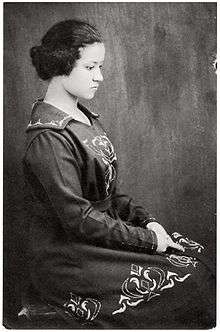Florestine Perrault Collins
| Florestine Perrault Collins | |
|---|---|
 Self-portrait, early 1920s | |
| Born |
Florestine Marguerite Perrault 1895 New Orleans |
| Died | 1988 |
| Nationality | African American |
| Known for | Photography |
Florestine Perrault Collins (1895–1988) was an African-American photographer based in New Orleans. Out of 101 African-American women who identified themselves as photographers in the 1920 U.S. Census, Collins was the only one in the New Orleans area.[1]
Life and Career
She was born to parents who were free people of color and her father had a well paying job, but as the oldest child of six she had to discontinue her formal education to help add to the family's income. She began to photograph at the age of 14.[2] Her subjects ranged from weddings, communions, and graduations to returning soldiers.[1]
At the beginning of her career she had to pass as white to be able to assist photographers.[3] By the time she opened her own studio she did not have to hide her race and photographed African-American families. She gained a loyal following and had success, due to both her photography skills and marketing skills through advertising in newspapers and playing up the sentimentality of a well done photograph. She also often advertised her business by including a photograph of herself to distinguish herself from her male competitors who might not been seen as being as good taking portraits of babies and children.[2]
Florestine Perrault Collins career "mirrored a complicated interplay of gender, racial and class expectations". [2] Indeed, her first husband, Eilert Bertrand, restrained her public appearances, conforming to the conservatist idea that married women should devote themselves to domesticity and the household. In the early times of her career, she also had to pass as white in order to increase her employment chances. “The history of black liberation in the United States could be characterized as a struggle over images as much as it has also been a struggle over rights.” according to bell hooks. Florestine Perrault Collins photographies are representative of that. By taking pictures of black women and children in domestic settings, Florestine Perrault Collins challenged the pervasive stereotypes of the time about black women.
Legacy
She was featured in the 2014 documentary Through A Lens Darkly: Black Photographers and the Emergence of a People.[4] She is recognized as a photographer who went against the popular narrative of negative portrayals of African-Americans in the media by working with her clients to make photographs that "reflected pride, sophistication, and dignity."[5]
Her work has been included in many exhibitions in New Orleans in the late 1900s and early 2000s, such as Women Artists in Louisiana, 1825–1965: A Place of Their Own[6] and is the subject of the 2013 book Picturing Black New Orleans: A Creole Photographer’s View of the Early Twentieth Century by Arthé A. Anthony.[7]
References
- 1 2 "Florestine Perrault Collins." KnowLA Encyclopedia of Louisiana. Ed. David Johnson. Louisiana Endowment for the Humanities, September 12, 2012. Web. March 8, 2015.
- 1 2 3 Florestine Perrault Collins and the Gendered Politics of Black Portraiture in 1920s New Orleans Arthé A. Anthony. Louisiana History: The Journal of the Louisiana Historical Association, Vol. 43, No. 2 (Spring, 2002), pp. 167–188
- ↑ Developing Images, New Orleans Magazine, July 2008
- ↑ "Through a Lens Darkly: Black Photographers and the Emergence of a People". PBS.org. Retrieved March 10, 2015.
- ↑ https://floridabookshelf.wordpress.com/2014/12/12/new-film-shares-pioneering-photography-of-florestine-perrault-collins/
- ↑ NOMA and THNOC Present Women Artists in Louisiana, 1825–1965: A Place of Their Own, New Orleans Museum of Art
- ↑ Picturing Black New Orleans, Learning through the lens of Florestine Perrault Collins